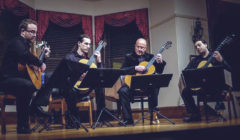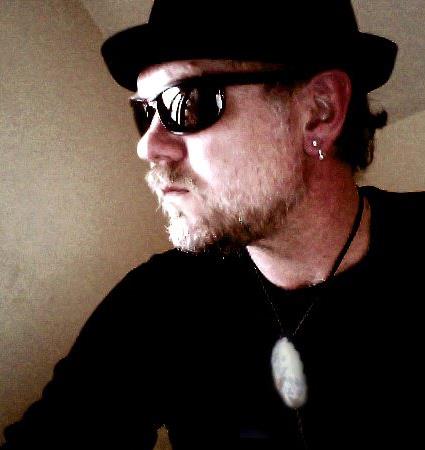James Horan Practical Passion in Action
One thing that makes me crazy is bitching. Seems these days, in our incredibly rapidly growing hyper-sensitive world that everybody is pointing the finger somewhere else, looking for the responsibility to belong elsewhere. To me this is a sure sign of societal illness. We’ve created a sort of, blame culture, by now —all in the quest for convenience.

Classical Guitarist James Horan.
Musicians bitch right along with everybody. They knock the scene, the clubs, each other, digitization and technology, the bass player and even the onset of new music … all in the frustration of trying to make it as a musician. I’ve seen it over and over again.
Then there is James Horan. James is no whiney-baby. He innately understands that if you’re the one complaining, then you must be the one not doing enough about it. He’s a great example of what a person with an idea … an inspiration … along with a great “can do-let’s do!” Attitude can do —should do— to the opposite of bitching. He creates his own destiny. A destiny which can be shared artistically with others.
He plays classical guitar. He develops and produces shows all over the state. He encourages his peers by his own example and effort. He sticks up for the high art of what we as musicians are doing. He raises the bar to a high level of artistic integrity as opposed to taking anything he can get by way of opportunities that feature musicians as bar background music. And we need more of that in the world. And in our city.
I’ve seen him around at Guitar League, which is a club focused on the area’s guitar-loving culture. But, I ran into him a few days ago while shopping for shirts, of all things. We got to talking which lead to this chat.
Chuck Schiele: Hi James. Thanks, so much for doing this article for Sounds of Syracuse.
James Horan: Thank you Chuck.

The Great Lakes Guitar Quartet including Benjamin Ellis, Christopher Polak, James Horan and John Ferrara
CS: How did you get started in music?
JH: I was introduced to piano lessons at around 5 years old. My mother started all the kids with lessons with a great teacher, Mrs. Plum. This formed the base of my understanding of scales and music notation. I later studied the clarinet until high school when I was exposed to the electric guitar. My buddies Steve Feldman and Rob Coye would jam in an Attic in the University Area and Steve was playing a Les Paul through a 5 watt Vox amp. It was raunchy and out of this world. I went home and found a telecaster for sale for $150 and was hooked.

James during an open mic night at the Red House Café
CS: Tell us a brief history of your music.
JH: I played piano, clarinet and guitar. I had lessons for the piano and clarinet but was self-taught playing rock and roll guitar. I had the luck to play with some local musicians around town in the early 1980’s. That career came to a quick close when I was 21 and started a family. About 20 years later I was at a U2 concert in Philly and came away wanting to play the guitar again. A friend of mine (Chris Grenner) had a little shop in Armory Square and he sold me a Martin to start playing with. I met a guy named Dick Ward who had started a thing called the Guitar League and I finally went to a meeting about 6 months later. It was awesome. -I had discovered a peer group of musicians and was
totally inspired. I became very involved with the GL and started to help produce the meetings as well as the live concerts we were producing at the time. They were bringing in some great players like Stephen Bennet, Laurence Juber (ex-Wings), and the great Tommy Emmanuel. I also became friends with Loren Barrigar and he was a great help in getting me to play again. I was in Nashville with Loren and Dick when I discovered the Classical Guitar. I came back from my first trip to Nashville with a fire in my heart to learn how to play classical guitar. I found a teacher this time and started taking lessons and practicing every day 3-5 hours a day. My interest in the classical guitar has led me to be on the board of the Great Lakes Guitar Society and to help establish the GLGS in the Syracuse area. The GLGS has been involved in promoting guitar and performances in the area for last 7 years.
CS: Who inspires you most?
JH: I think when it comes to music I am inspired by the passion a person puts into their craft. When you see a person take on their art and really work to develop it so that they can share what they feel inside with you through performance, it is awesome. There is a huge difference between a note and the potential it holds to become music. When you hear great music whatever the genre you know it is such. It takes the listener somewhere.
CS: Wow! And ditto!
Tell us about the concert series you’re involved with.
JH: In 2015 I saw a Guitar performance at the Skaneateles Library by Dr. Timothy Schmidt. The room they have there holds about 90 people and has a great stage. I was sitting next to the Executive Director Nickie Marquis and said it would be a great thing to have a regular perforce series here. She agreed and we started the series with a small grant that was provided through the office of Senator John DeFrancisco. The main focus of the series was to create a venue for music performance that allowed people to play outside of the bars and coffee houses that showcased their art. Bars and restaurants are great patrons of musicians, but often, the performance is lost to the food, drink and televisions. In its third season the series is really well accepted and the audience is very strong. We have some really high level players coming across the stage —some local and many from around the nation. In July, Loren Barrigar will be performing a benefit concert for the series. We hope to continue to have classical and other guitarists perform from different genres as well.
CS: Please share with us your views on music in the area.
JH: When I returned from NYC to live, I was surprised to see the local scene really starting to decline. I think it is a common problem everywhere. I know Europe is suffering the same problems. We have so many well trained and creative people, yet, the outlets have faded away. We all know that other things like YouTube have offered some opportunities to get your work out but that does not come close to replacing “Live” performance. The experience of performing live or seeing a live performance can not be replicated in a video. There are people making an effort to produce small performances. Steeple Coffee House, Nelson Odeon, Auburn Public Theatre, The Redhouse etc. … but the days of a band in every bar or lots of small venues for acoustic music is all but a shadow of itself anymore.
 CS: Please share with us how you sort of create venue opportunities.
CS: Please share with us how you sort of create venue opportunities.
JH: One of the things I heard a few years back that really struck me as a key to having meaningful music performances was what guitar great Tommy Emanuel told Loren Barrigar about growing his career. He said “Loren you do not want to play in the bars, you belong on a stage in front of audience that has come to see you.” That stuck with me. I watched Loren grow his career by seeking out places to play in most cases that offer a chance to put on a real show. Not just play for pay. The idea of finding a venue that is right for a performance and then producing a show is a bit daunting to some, but, the rewards can be far greater if you do it. When you perform you have an audience there to listen. You perform early in the evening in most cases allowing more people a window of opportunity to attend. Also people are willing to pay to come and listen. When we first started to produce performances for the Great Lakes Guitar Society we wanted places like small art galleries, great chapels or an outdoor setting that is intimate. If you pack a 100 seat venue to the walls it is the best feeling when you perform. I know as an audience member I love a full house too. I would love to see some of our local musicians in venues that inspire. The downside of self produced small shows is low and the experience is extremely rewarding. My quartet once put on a performance in a boutique wine store in the Hawley District. We cleared the floor, put out 50 seats and had a concert and wine tasting. It was SRO and everyone loved it. It was so far form normal that you could only win.
CS: Advice for new or budding musicians.
JH: The only thing I know about starting out is that if you have that fire in your stomach to get better at what you are learning —you need to serve that passion. You need to learn, practice, attend live performances and perform if you have something to share.
CS: What’s in your music near future?
JH: I am producing the Skaneateles Guitar Series at the Skaneateles Library every month and rehearsing with the Great Lakes Guitar Quartet. We will open the show in July at the Library with Loren Barrigar.
CS: How do we stay in touch with your and your music?
JH: www.skaneateleslibrary.org











